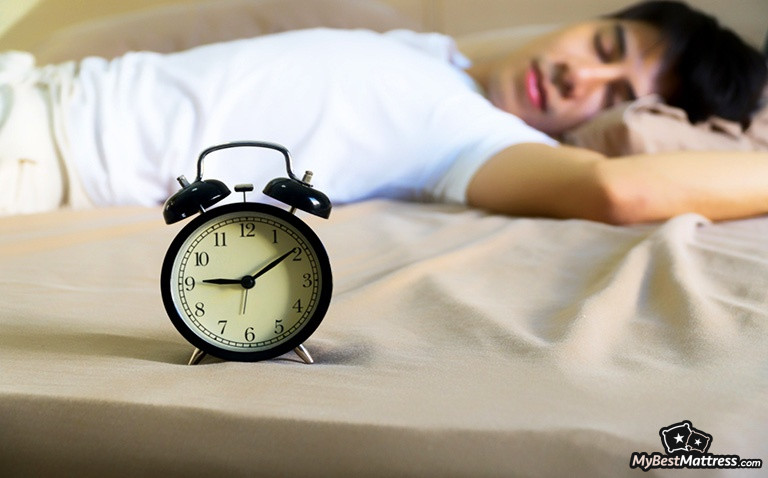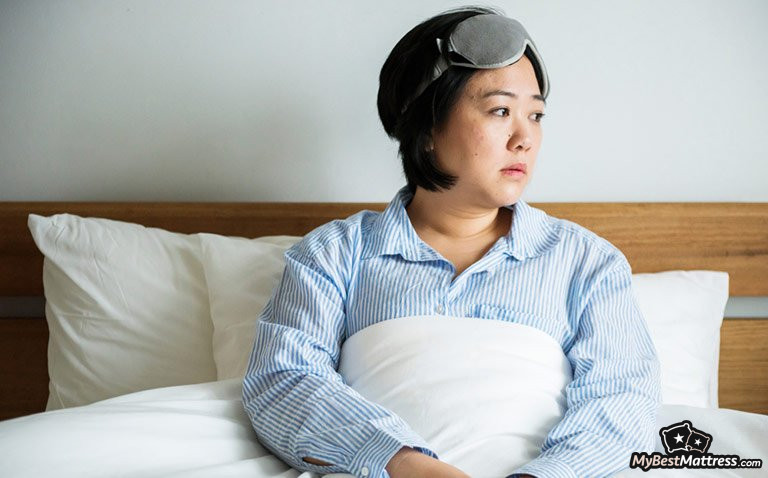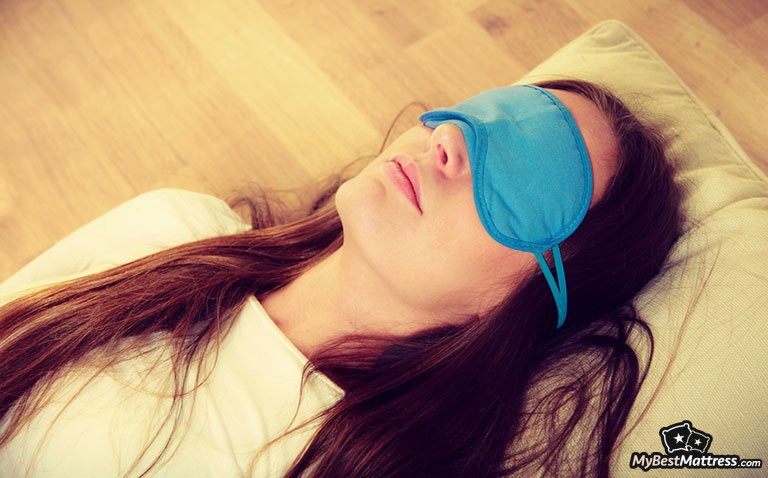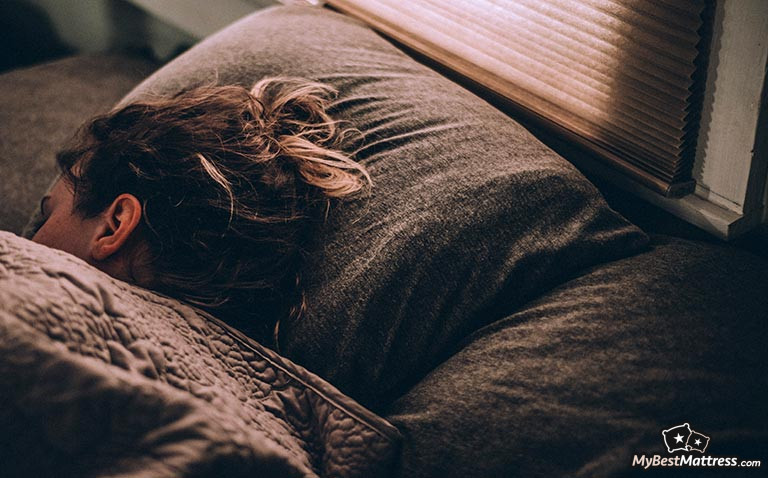
Two out of every five children experience night terrors, also known as sleep terrors or pavor noctumus. Most of them grow out of it as they get older – nevertheless, you would be wrong to only think of it as a childhood issue.
While night terrors in adults do occur a lot less frequently and are not actually recognized as a medical condition, they still affect almost 2 percent of the population. If you don’t experience them yourself, it might be your relative or a loved one – therefore, it’s rather handy to know how to deal with night terrors as they occur.
What is important to know about night terrors in adults? Are they dangerous?
Night terrors are most common in children, but they can affect adults too. An adult can have night terrors at any time during the sleep cycle, and they are more likely to remember the dream than children are. Adults are more likely to have night terrors if they have a history of bipolar disorder or depression or anxiety. Sometimes, night terrors can lead to injury for the person or other people, especially if they thrash about or go sleepwalking as well. An adult is more likely to display aggressive behaviour than a child during night terrors.
Table of Contents
- 1. What Exactly a Night Terror is – And What it is Not
- 2. What Causes Night Terrors in Adults and How to Prevent Them
- 2.1. Possible Triggers That Lurk in Your Mind
- 2.2. Physiological Reasons to Consider
- 3. How to Stop Night Terrors from Affecting Your Daily Life
- 3.1. Diagnosing the Condition
- 3.2. Choosing and Starting Night Terrors Treatment
What Exactly a Night Terror is – And What it is Not
The term itself is quite self-explanatory: night terrors in adults are episodes of intense fear that happen while you’re asleep. It’s a type of parasomnia, commonly defined by symptoms like:
- The usual signs of panic – increased sweating, rapid breathing and heart rate
- Confusion and blank stare – wide-open eyes, yet no actual responsiveness
- Loud crying, screaming, and shouting
- Convulsions and involuntary movement, such as kicking
Normally, night terrors in adults tend to last from under a minute to five minutes. However, in rare cases, it might last as long as ten minutes. As the person never reaches a fully awake state, they usually don’t remember the episode in the morning. That’s also why some people never look for night terrors treatment: they’re simply not aware of having them.
The problem is, a person who doesn’t know how to stop night terrors risks injuring themselves. Moving unconsciously yet intensely, they might fall out of bed or hit themselves to a hard surface nearby (think of a nightstand or a nearby wall).
In addition to that, you can hurt the person sleeping next to you, or simply harm their sleep – especially if the terrors occur on a regular basis. If you live in an apartment building, don’t be surprised if you receive some weird looks from your neighbors as well – a piercing scream in the middle of the night is definitely not music to everyone’s ears.

While they might look similar at first, night terrors in adults should not be confused with nightmares. It’s true they can cause panic as well – however, in such a case, the frightened person wakes up fully and remembers the disturbing dream. Nightmares also rarely ever repeat in a regular manner, as night terrors tend to do.
Another clear difference is the state of sleep the accident occurs in. There are two main types of sleep that alternate during the night. They’re known as REM (rapid eye movement) and non-REM sleep. The eye movements are related to active dreaming, and so nightmares occur during the REM sleep, which takes up around a quarter of the whole sleep cycle. Night terrors in adults normally don’t involve any dreams and happen in the non-REM sleep stage.
Sleepwalking, also known as somnambulism, is also often associated with night terrors. The truth is, some terrors do lead to sleepwalking: a person might sit up, get out of their bed, walk and even run around the house. In such cases, night terrors treatment is advised due to a higher risk of potentially harming yourself or others.
Not every case of sleepwalking is provoked by a night terror, and not every person experiencing night terrors will sleepwalk. However, both of these conditions occur during non-REM sleep, and some scientists even think that both sleepwalking and night terrors in adults can be caused by a person’s inability to maintain this stage of the sleeping cycle.
What Causes Night Terrors in Adults and How to Prevent Them
For children, night terrors are often random – in most cases, no clear triggers can be identified. With adults, it’s a different story. If you’re looking at how to stop night terrors, a good place to start is getting to know all the possible reasons for one to occur.
Possible Triggers That Lurk in Your Mind
One of the most common triggers that can provoke night terrors in adults is simply not getting enough good quality sleep. If you only sleep a few hours every night and have a very inconsistent bedtime, there’s no wonder your body feels stressed and can't relax enough to rest properly. This is also an issue that commonly haunts frequent travelers: as you cross multiple time zones at an impressive speed, your sleep cycles simply can’t catch up!
Before falling asleep, a lot of us think about the day’s events and reflect on important conversations that took place. This is normal and usually does not affect the sleep of a healthy person. However, if you suffer from psychological issues such as severe stress, anxiety, or depression, you might not be able to get a good rest.
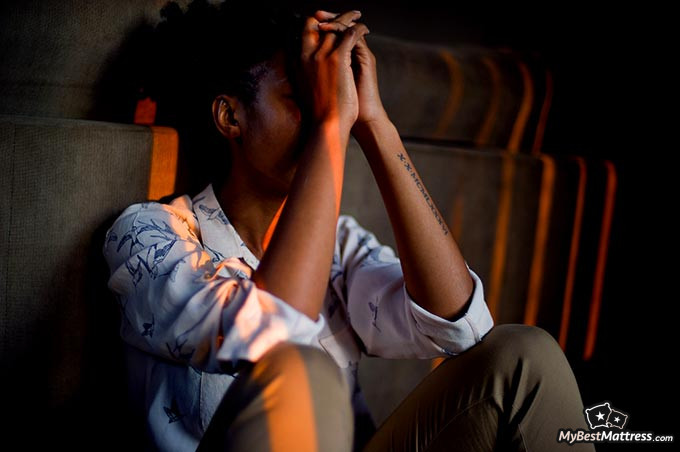
If so, make sure to treat these problems before you look into how to deal with night terrors, as they can be directly related to your diagnosis.
Night terrors in adults can also be caused by trauma, such as a painful divorce or a nasty car accident. They are also rather common among people with post-traumatic stress disorder (PTSD), such as army veterans[1].
These patients have experienced very sudden or violent losses, assault, abuse, or had disturbing near-death experiences, which leaves them living with constant fear and barely-controllable anxiety. With conditions like that, it’s only natural for a night terror to creep in. If that is the case for you, make sure to consult a therapist and seek professional counseling.
Latest Saatva Coupon Found:
UP TO $500 OFF
Limited-time Saatva Sale
We're sharing a limited-time Saatva mattress discount with our readers! Grab this deal & enjoy your new mattress with huge discounts.
Physiological Reasons to Consider
On a lighter note, did you know your stomach can also get in the way of you trying to get a terror-free night sleep? To minimize the risk of an episode, there are three things you should stay away from:
- Alcohol, which is known to affect the levels of melatonin in your system. Melatonin is a hormone that takes care of your internal clock – as its level decreases, your natural sleep cycles might be disrupted as well.
- Caffeine – try to avoid coffee, black tea, and other caffeinated beverages in the second half of your day. If you feel sleepy after lunch, beat that with a glass of orange juice or a brisk walk around the office instead!
- Some types of medication, including, but not limited to, stimulants and antidepressants. Sleep can be disturbed by something as innocent as a cough syrup! If you feel like a certain drug has affected your sleeping pattern, consult your doctor about changing the dosage or the very type of medication to one that suits you better.
When discussing what causes night terrors in adults, we must also mention sleep apnea. It’s a condition that causes a person to temporarily stop breathing while they’re asleep. Episodes of apnea might last for seconds or minutes, and sometimes the brain might even try to wake the person up to save them from potential suffocation.

In such cases, a person might experience a micro-waking period: while they’re not fully awake, they’re awake enough to continue breathing. This can potentially be a great window for night terrors in adults to strike.
How to Stop Night Terrors from Affecting Your Daily Life
Before you start reading on how to deal with night terrors, consult your doctor and find out whether your suspicions are true. Upon confirming that what you or your loved one is experiencing is indeed night terrors, they will also be able to recommend the kind of treatment that suits your unique situation best.
Normally, there’s no need to worry about night terrors in adults. However, there are a few cases that might cause concern. Make sure to speak to a medical professional if the episodes are putting you at risk of injuring yourself or others, disturbing the sleep of your partner, or affecting your own daily life (i.e. by causing daytime sleepiness[2]).

Did you know?
Have you ever wondered which mattresses are approved as the best for sleep?
See & compare TOP mattresses side by sideDiagnosing the Condition
There are two main ways for night terrors in adults to be diagnosed. First, you can have a simple conversation with your healthcare provider, during which you’d discuss your health history and all the medical reasons that might invoke night terrors. To prepare for the interview better, you can keep a sleep diary for a few weeks (or months) and register each night terror that occurs.
This will help your doctor to evaluate the frequency and intensity of your episodes.

Another option you can take is a polysomnographic test, which will require you to spend the night in a laboratory and have various tests performed while you’re sleeping. You are most likely to be filmed and get your heart rate, breathing rate, eye movements, and other vital factors evaluated.
However, this is not a widely available option, as it’s not too common for a medical institution to have its own sleep laboratory. Small supply means it might come at a price, too.
Choosing and Starting Night Terrors Treatment
We have already discussed what causes night terrors in adults, and you know there can be a multitude of reasons behind it. This also means there’s more than a single way to treat it.
If your night terrors are caused by a pre-existing medical condition such as depression, you should deal with it first. After all, why concentrate on symptoms when you can simply eliminate the cause? This is also the only case when treating night terrors in adults might require medication.
We can’t stress this enough: do not treat yourself without consulting a medical professional! Psychiatric drugs can only be prescribed individually after evaluating a bunch of various factors and the appropriate dosage varies from person to person.

Needless to say, the best way to deal with stress-induced night terrors is avoiding stressful situations – however, it’s not always an option. Plus, it often depends on your attitude more than the stressor itself. If you feel like you cannot deal with the situation on your own, don’t be afraid to seek counseling.
There are many types of psychotherapy to choose from, and every issue can be solved with the right approach. In addition to that, you can always look into complementary therapy, such as art therapy, yoga, or aromatherapy.
For some, night terrors are simply caused by a messy sleep pattern. Here are a few tips that might help you deal with them on your own:
- Make sure you leave yourself enough time to sleep. This might look like a no-brainer – however, you had issues with that, didn’t you? Make it a habit to go to sleep eight hours before you need to get up. For example, if you set your alarm for 6 AM, you should be in your bed by 10 PM at the latest.
- Avoid stimulants right before bedtime. Have your last meal of the day a few hours before bed, and spend your last hour without staring at screens. We’re talking computer, television, even your smartphone: the blue light these screens emit disturbs your internal clock, which results in having troubles falling asleep.
- Do everything you need to feel safe and secure before sleep. Lock the doors, close the windows, move anything that might cause you to trip if you get up at night. Some night terrors in adults manifest in intense movements – if you’re experiencing something similar, it might also be a good idea to have your mattress closer to the ground. This way, you can’t injure yourself if you fall. If you tend to sleepwalk, think of moving sharp or breakable objects as well.
- A sleep diary was mentioned above as a great way to prepare for your doctor’s appointment – however, you can find it useful to yourself as well. Getting to know the regularity of your episodes can be a great help in learning how to deal with night terrors. For example, if they happen at a similar time, you can prevent them by using an alarm to wake you up right before the delicate moment.
Understanding what causes night terrors in adults is the first step to dealing with them. By doing your research and looking for informative articles on the topic, you’re already on the right path. Take care of your body and mind – just like a battery, they run for longer when they’re freshly recharged!
Also, a brand new mattress might be just what you need to help you deal with sleep issues - well, at least alleviate them. Do look into that, too!
Contributed By Sue Peacock, Consultant Health Psychologist
Dr. Sue Peacock is a leading Consultant Health Psychologist registered with the Health and Care Professions Council. She is an Associate Fellow of The British Psychological Society and a Registered...
Read Full Bio...Scientific References
Contributed by Sue Peacock, Consultant Health Psychologist1. Don Richardson J, King L, St Cyr K, et al.: 'Depression and the relationship between sleep disturbances, nightmares, and suicidal ideation in treatment-seeking Canadian Armed Forces members and veterans.'
2. Lopez R, Jaussent I, Dauvilliers Y: 'Objective daytime sleepiness in patients with somnambulism or sleep terrors.'
Leave your honest feedback
Leave your genuine opinion & help thousands of people to choose the best mattress. All feedback, either positive or negative, are accepted as long as they’re honest. We do not publish biased feedback or spam. So if you want to share your experience, opinion or give advice - the scene is yours!








